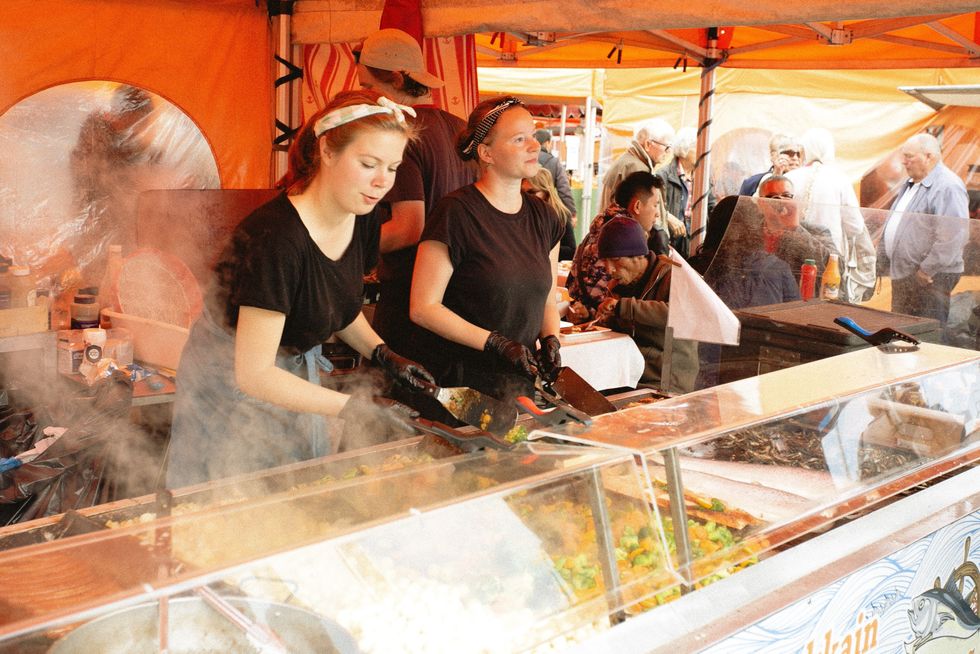Amid the many other problems that are being emphasized during the COVID-19 pandemic, an ongoing struggle for thousands of Missourians has become more prevalent; Food Insecurity.
An organization that has made it their mission to solve food insecurity across a 32-county area is The Food Bank for Central & Northeast Missouri. Filling the need of hunger through hundreds of pantries, shelters, and public schools, has been a part of the local food bank's mantra since 1981. Accomplishing their organization's mission has become more difficult during the coronavirus outbreak.
Normally the food bank has over half of their staff being made up by volunteers. They would help package, label and ship off food products to the many pantries they collaborate with. Tyler King, volunteer room coordinator has been a part of their team for two years and can see the shifts that are being made to continue to meet that need.
" Now with the coronavirus we're not taking any volunteers," King said. "So my job is kind of transitioning to more of the actual repacking day-to-day stuff that volunteers would usually do."
Despite a change in his duties, King has always felt a passion for helping his community and saw the change as not much of a difference. Coming from Long Beach, California- a state that is familiar with hunger and food insecurity, he knew once moving to Columbia he wanted to get involved.
"Within the 32 counties, I've gotten to see firsthand how many people need help," King said. "So being able to provide that help and make sure that people don't have to worry day-to-day about whether they are going to eat or not is a part of what the food bank does."
Before worrying about quarantines, stay at home orders and empty shelves at local grocery stores, one in seven people living in Missouri worried where their next meal would come from. This statistic, which is stated at the beginning of the food bank's voice operator system just barely scratches the surface of the issue.
Sandy Rikoon, dean of the College of Human Environmental Sciences and co-director of the MU Interdisciplinary Center for Food Security, has been involved in studying the issue closely. In an article done by Mizzou News on the making of 2019 Missouri Hunger Atlas, which charts food insecurity and hunger on a county-by-county basis, Rikoon discussed how food security was and still is a statewide problem.
"Three years ago we reported that Missouri households were the hungriest they had been in decades," Rikoon said. "We are happy that things have improved, yet food insecurity remains a fact of life for nearly 15% of the state's population."
In addition to that 15%, more than 275,000 Missourians have experienced disruptions in their normal eating pattern and reduced food intake in the past year. Rikoon and other experts such as Bill McKelvey, co-author of the 2019 Missouri Hunger Atlas, suggested that in order to end food insecurity it included tackling poverty and wealth disparity in Missouri. Addressing poverty in Missouri during this time is more complicated than ever before due to more than 300,000 unemployment claims being made in Missouri related to COVID-19, 7,787 of those claims coming from Boone County alone.
When people think of food insecurity they typically see it as a side effect of an extreme case of poverty and that it isn't something that occurs often even for working class citizens. Seth Wolfmeyer, communication and marketing coordinator for the food bank, knows all too well how just one event can cause someone to become food insecure. Currently, that one event for many Missourians is the coronavirus, putting thousands of workers out of the workforce and thousand of children out of school.
"Food insecurity is a very real issue in Columbia -very real issue anywhere you want to look at in Missouri," Wolfmeyer said. " And because of this crisis it's only going to get more challenging. We've seen more people out of work and being able to afford food does pose a big problem for families, especially families with children."
At this point during the crisis, Wolfmeyer and King can see the rise in amount of people who are relying on the food bank to provide food to the local shelters and pantries such as the Central Pantry, 1007 Big Bear Blvd. With this increase comes a few struggles to respond to those needs. In addition to the loss of their volunteers, food donations, a huge component of how the food bank is able to distribute food to their collaborations has come to a slow halt in order to minimize human contact with the food. This has made it food distribution of the food bank to be put under question on whether or not they could continue.
Struggles and changes however, does not deter the food bank and its staff from serving the community. On their website they have listed an action plan ensuring people of the community that they'll still be providing nutrition foods during the crisis. Also listed is the changes their partner agencies have made in response to the CDC health recommendations during this time. Some of those adjusts has been switching to drive thru and delivery services for the pantries and soup kitchens and the continuation of providing buddy packs for Columbia Public School students. Along with this one of their bigger projects in response to coronavirus is their Mobile Pantry program. This program allows trucks to go and provide food for those who don't have access to traditional hunger-relief organizations.
"Yeah, it [COVID-19] definitely has made things more difficult," King said. "But we have a great staff here, and we've taking it upon ourselves to do the day-to-day stuff. It's a total team effort to complete our mission."

















